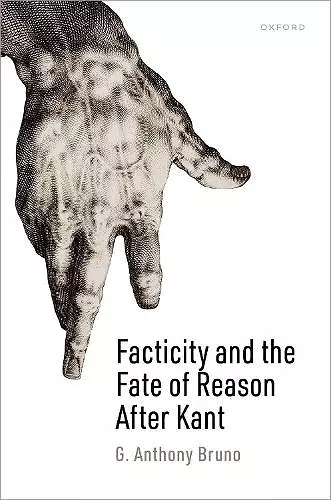Facticity and the Fate of Reason After Kant
Format:Hardback
Publisher:Oxford University Press
Published:19th Mar '25
Should be back in stock very soon

Facticity and the Fate of Reason After Kant is the first history of the concept of facticity. G. Anthony Bruno argues that this concept's coining, transmission, and repurposing by post-Kantian thinkers leaves a lasting divide concerning the question of whether a science of intelligibility can tolerate brute facts. In the phenomenological tradition, 'facticity' denotes undeducibly brute conditions of intelligibility such as sociality, mortality, and temporality. This suggests an affirmative answer to the post-Kantian question. However, the term's original use in the German idealist tradition is associated with a negative answer: a science of intelligibility must eliminate bruteness in order to be systematic, as Fichte says, or presuppositionless, as Hegel says. Moreover, eliminating bruteness requires a new logic for deducing conditions of intelligibility from reason's self-contradictions, a dialectical logic that Fichte invents and Hegel develops. In response to the German idealists, Heidegger argues that dialectic ineluctably presupposes brute facts of lived experience, whose interpretation requires a hermeneutics of facticity. The untold history of the concept of facticity thus contains the deepest parting of the ways after Kant, one in which reason is fated to transform from the hand that holds the world to the thrown activity of being-in-the-world. Facticity and the Fate of Reason After Kant explores this transformation while confronting our inheritance of the still-pressing post-Kantian question.
G. Anthony Bruno's study breaks new ground in showing how the quest for a 'presuppositionless' science of knowledge shaped the main contours of post-Kantian thought into the early twentieth century. The book is a tour de force investigation of the lasting legacy of German Idealism, one that offers original insight into its historical context and enduring philosophical value. * Owen Ware, University of Toronto *
Bruno has elegantly demonstrated that debates about the nature of reason from Kant and German Idealism (including Fichte, Schelling, and Hegel) to Heidegger (via Husserl, Dilthey, and Lask) turn inter alia on the problem of 'facticity' (the problem of whether reason can be completely self-justifying or rather rests on irreducibly non-rational grounds, such as the contingent ontological constitution of the human being). The scholarship is superior, the interpretations provocative, and the prose eminently readable. Facticity and the Fate of Reason After Kant provides an original historical genealogy seamlessly connecting German idealism to phenomenology by reference to a fundamental philosophical problem. Historians and philosophers interested in modern philosophy in and after Kant stand to learn a great deal from Bruno's carefully crafted monograph. * Tarek Dika, University of Toronto *
Bruno's book sheds new light on the history of post-Kantian thought from Fichte to Heidegger by turning to the under-appreciated problem of facticity: can a philosophical account of the necessary conditions of intelligibility avoid the problem of brute facts? Through the lens of this question, Bruno stages a series of illuminating confrontations between the key figures of German idealism and phenomenology, making a strong case that the fault lines of post-Kantian thought revolve around facticity as a central problem. * Karen Ng, Vanderbilt University *
One of Kant's most challenging innovations is the idea that some features of humanity are at once both internal to human reasoning and also groundless. Here lies a parting of the ways. On one hand, Hegel, uncomfortable with the very idea of groundlessness as internal to human reasoning, seeks a stronger conception of human reason, trusting in itself alone, and sufficient for its own explication. On the other hand, Schelling and Heidegger embrace the radical bruteness of forms of intelligibility, which philosophy cannot deduce but must interpret. Thus the question raised by Bruno, still vital today, ultimately concerns the very nature of philosophy: should it aspire to the self-sufficiency of the science of reason, or interpret the radically contingent conditions of human life? This brilliant book presents these options in a lucid and compelling manner. * Paul Franks, Yale University *
ISBN: 9780198875673
Dimensions: 240mm x 165mm x 25mm
Weight: 664g
352 pages